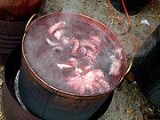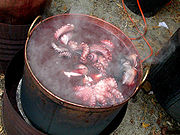
Polbo á feira
Encyclopedia


Galician people
The Galicians are an ethnic group, a nationality whose historical homeland is Galicia in north-western Spain. Most Galicians are bilingual, speaking both their historic language, Galician, and Castilian Spanish.-Political and administrative divisions:...
dish.
This dish is prepared by first boiling the octopus inside a copper cauldron
Cauldron
A cauldron or caldron is a large metal pot for cooking and/or boiling over an open fire, with a large mouth and frequently with an arc-shaped hanger.- Etymology :...
. Before actually boiling it, the octopus is repeatedly dipped in and out of the boiling water, held by its head. The objective of this operation is to curl the tips of the tentacles. The tentacles are preferred over the head, which sometimes is discarded. The tendrils are sometimes best cherished by children. After the octopus has been boiled, it is trimmed with a scissors, sprinkled with coarse salt and paprika
Paprika
Paprika is a spice made from the grinding of dried fruits of Capsicum annuum . In many European languages, the word paprika refers to bell peppers themselves. The seasoning is used in many cuisines to add color and flavor to dishes. Paprika can range from mild to hot...
(pemento picante) and drizzled with olive oil
Olive oil
Olive oil is an oil obtained from the olive , a traditional tree crop of the Mediterranean Basin. It is commonly used in cooking, cosmetics, pharmaceuticals, and soaps and as a fuel for traditional oil lamps...
. The optimal cooking point is the one in which octopus is not rubbery but not overcooked either, similarly to the al dente
Al dente
In cooking, the Italian expression al dente describes pasta and rice or beansthat have been cooked so as to be firm but not hard. "Al dente" also describes vegetables that are cooked to the "tender crisp" phase - still offering resistance to the bite, but cooked through...
concept in Italian pasta
Pasta
Pasta is a staple food of traditional Italian cuisine, now of worldwide renown. It takes the form of unleavened dough, made in Italy, mostly of durum wheat , water and sometimes eggs. Pasta comes in a variety of different shapes that serve for both decoration and to act as a carrier for the...
cooking. This is achieved after approximately a 20 minutes boil, provided that the octopus is left to rest for a further 20 minutes inside the boiled water away from the fire.
The dish is traditionally served on wooden plates, along with sliced boiled potatoes (cachelos) and bread. The traditional plates are disappearing in some places for hygienic reasons. Tradition dictates that drinking water should not accompany octopus, so the dish is usually accompanied by young red wine.
It is somewhat paradoxical that octopus has been historically more widespread in the Galician hinterland than on the coastal regions. Traditionally, this diatopic use of octopus was facilitated by its inland availability as stockfish
Stockfish
Stockfish is unsalted fish, especially cod, dried by cold air and wind on wooden racks on the foreshore, called "hjell". The drying of food is the world's oldest known preservation method, and dried fish has a storage life of several years...
. In the last decades, frozen octopus has replaced dried octopus. Fresh octopus is not so frequently used nowadays either, as it is necessary to pound it heavily before cooking to avoid the dish becoming rubbery. This procedure can be skipped after freezing, which, unlike it happens with other fish, does not alter the organoleptic properties of octopus.
The provinces of Ourense
Ourense
Ourense is a city in northwestern Spain, the capital of the province of the same name in Galicia. Its population of 108,674 accounts for 30% of the population of the province and makes it the third largest city of Galicia.-Population:...
and Lugo
Lugo
Lugo is a city in northwestern Spain, in the autonomous community of Galicia. It is the capital of the province of Lugo. The municipality had a population of 97,635 in 2010, which makes is the fourth most populated city in Galicia.-Population:...
have by and large a reputation for good octopus cooking. Fair style octopus is the totemic food of the patron saint festivities of Lugo (San Froilán). Some Galician cooks specialize in this dish. They are usually women, known by the name pulpeiras (pidgin Spanish/Galician name). After the modern decay of traditional rural fairs, many pulperías (octopus restaurants, by its Spanish name) have sprouted across the Galician geography. Pulperías tend to be rough-and-ready eateries, rather than refined restaurants.

